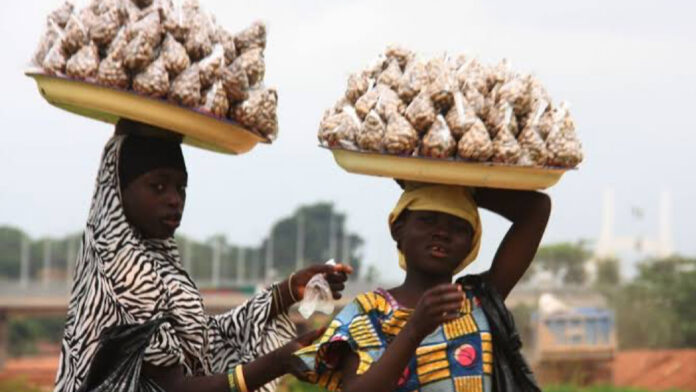In the bustling cityscape of Kano, where the pulse of life beats to its own rhythm, the profound challenges faced by young girls engaged in street hawking paint a poignant picture of struggle and fortitude. Amidst the vibrant marketplace, these girls find themselves caught in a silent battle, their dreams overshadowed by the harsh reality of street harassment.
Each morning, Amina sets out through the chaotic streets, her head adorned with a basket of goods she hopes to sell. As she navigates the bustling marketplaces, the once-promising avenues of economic opportunity transform into perilous territories where her innocence is ruthlessly exploited. Amina, like many of her peers, becomes a silent victim of gender-based violence. She endures lewd comments, unwelcome advances, and sometimes even physical groping from strangers and shopkeepers.
Zara, a fifteen-year-old hawker of fresh fruits, shares a similar tale of harassment. One afternoon, she was followed and harassed by a group of older men who made vulgar remarks and gestures. Despite her attempts to ignore them, Zara’s sense of safety dissolved into fear and anxiety.
Fatima, barely thirteen, recalls her own ordeal of verbal abuse and intimidation by local vendors. When she resisted their advances, she was threatened with physical violence. The stories of Amina, Zara, Fatima, and countless others shed light on the pervasive nature of the challenges faced by girl hawkers in Kano.
The repercussions of street harassment go beyond emotional trauma. The dreams that once brightened their eyes are clouded by fear and self-doubt. The abuse not only hinders their personal development but also perpetuates cycles of poverty and vulnerability.
Yet, amidst the darkness, glimmers of resilience emerge. Amina and her peers form a support network, a sisterhood that empowers them to speak out against the injustices they face daily. Together, they amplify their voices, demanding protection and change.
Addressing this deeply entrenched issue demands a multifaceted approach. Raising community awareness is crucial to foster respect and sensitivity towards gender issues. Educational programs must instill values of dignity and equality from a young age, challenging harmful norms and stereotypes.
Law enforcement agencies must take decisive action to prosecute perpetrators and ensure the safety of these vulnerable girls. Collaborating with local authorities is essential to develop and enforce policies that protect their rights and hold offenders accountable.
Skill development and education provide pathways to empowerment. NGOs and governmental bodies can create initiatives tailored to the needs of these girls, offering alternatives to street hawking through vocational training, apprenticeships, and formal education.
Economic empowerment is key to breaking the cycle of exploitation. Microfinance programs and entrepreneurship support enable families to explore sustainable income opportunities, reducing the pressure to send young girls onto the streets to support household finances.
Read Also:
Engaging community leaders and religious institutions is critical to shaping societal norms and values. Their influence can promote a collective commitment to eradicating gender-based violence and fostering environments where the dignity and safety of every girl child are upheld.
In conclusion, the stories of Amina, Zara, Fatima, and their peers underscore the urgent need for collective action against street harassment and gender-based violence. Through comprehensive strategies encompassing awareness, legal protection, education, and economic empowerment, we can transform the streets of Kano into spaces of empowerment for every girl child, where dreams can flourish without fear.
Expanding upon the challenges faced by Amina and her peers, it’s important to recognize the psychological toll of street harassment. Beyond the immediate physical threats, these girls endure emotional distress that can have lasting impacts on their well-being. Many experience heightened anxiety, depression, and a diminished sense of self-worth as a result of the constant fear and objectification they face on the streets.
Amina, for instance, often finds herself questioning her own worth and capabilities. The persistent harassment chips away at her confidence, making it difficult for her to envision a future beyond the confines of street hawking. Despite her dreams of pursuing education and becoming a teacher one day, she grapples with self-doubt fueled by the daily challenges she encounters.
The experiences of Amina, Zara, and Fatima highlight the urgent need for tailored support services that address the emotional and psychological impacts of gender-based violence. Counseling and mental health resources can provide essential tools for coping and healing, empowering these girls to reclaim their sense of agency and envision brighter futures.
Furthermore, amplifying the voices of these resilient young girls is crucial in driving systemic change. Advocacy efforts must prioritize their perspectives and experiences, ensuring that policies and interventions are informed by their needs and aspirations. By centering their voices in the discourse on gender equality and violence prevention, we can cultivate inclusive solutions that resonate with the realities of girl hawkers in Kano.
Collaboration with community stakeholders is instrumental in fostering sustainable change. Community leaders, educators, and parents must be actively engaged in dialogue and partnership to challenge harmful norms and promote environments where every girl can thrive free from violence and exploitation.
Ultimately, the journey towards ending street harassment and gender-based violence requires collective commitment and unwavering solidarity. By standing together with girls like Amina, Zara, and Fatima, we can create a future where every street is safe, every dream is achievable, and every girl’s voice is heard and valued. Through persistent advocacy, holistic support, and transformative action, we can pave the way for a brighter tomorrow for girl hawkers in Kano and beyond.
Abdulhamid Abdullahi Aliyu

























